Very nice sequence of updates. I like the weaving of a play script into your narrative - not seen that often if at all! Good job! 

In the Footsteps of Charlemagne - The Second Coming of House Karling
- Thread starter DensleyBlair
- Start date
-
We have updated our Community Code of Conduct. Please read through the new rules for the forum that are an integral part of Paradox Interactive’s User Agreement.
You are using an out of date browser. It may not display this or other websites correctly.
You should upgrade or use an alternative browser.
You should upgrade or use an alternative browser.
Very nice sequence of updates. I like the weaving of a play script into your narrative - not seen that often if at all! Good job!
Thanks - I was inspired to do a play script after reading 'The Bard's Kings', which a great AAR based around the English kings used as subject matter by Shakespeare. It's a good thing you like it, though, because there'll be at least two more updates just about the play
2.5.3: Act I; Scene IV; Act II, Scenes I-III.
"You agreed to what?" Marsilla was furious.
"My lord, all Karolvs Magnvs requests is that you convert to his faith. In return, he shall see to it that no harm befalls you-"
"And I suppose he still took the money! You fool, you imbecile, you mangy dog! Tomorrow morning I shall see to it that you can no longer call yourself my-" Suddenly, a group of actors burst onto the stage cheering loudly. One of them approached Marsilla.
"Hail Marsilla, saviour of Saragossa!" The actor went back to his position at the back of the stage and was replaced by another member of the troupe.
"Hail Marsilla the Wise, protector of our freedom!" Again, the actor went to the back of the stage, and another stepped forward.
"Hail Marsilla, the equal of Karolvs Magnvs!" Marsilla turned to the vizier and addressed him, speaking through gritted teeth.
"It seems, al-Rahman, your diplomacy has actually helped my reputation. You are excused, this time. But let me warn you, if you dare act without my permission again I shall flay you alive!"
"Yes, my lord." The actors all exited the stage, except one, who stayed to address the audience.
"My lords and ladies, the first part of our epic tale draws to a close. Pray, stay for the second, and delve further into this fine tale!" The actor then joined his colleagues off stage.
Four actors returned to the stage, dressed in elaborate costumes representing Charlemagne's paladins. Charlemagne spoke first.
"My trusted paladins, I grow tired of this war, let us make haste and return to dear Francia." A cry of 'hear hear' came from the paladins.
"My lord, surely we must send a messenger to the Muslims to announce our withdrawal from their lands?" The speaker was Roland, one of *Charlemagne's most trusted knights.
"Of course, Roland. Pray, who would you suggest we send?"
"Well, my lord, my stepfather Ganelon would be only too willing to oblige. Why not send him?"
"Ganelon, yes, I shall send him to Marsilla on the morrow. Tonight, my dear friends, we shall sleep well, knowing that dear Francia awaits with open arms!" The four actors quit the stage. Their was a brief applause from the audience, as two more actors entered the stage.
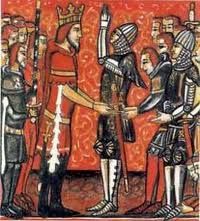
Charlemagne and his paladins.
"That bastard! How dare he suggest I be the one to deliver our message of withdrawal? Surely I will be eaten alive by those ravenous pagans! No, I see it now - that is that bastard Roland's plan! He wishes me dead, the perfect revenge for my hatred of him for all these long years. I think a plan is in need of development..." The two actors exited the stage, and were replaced, again, by Charlemagne and his paladins.
"Ganelon has left for Saragossa, my lord, our message should be received by this evening."
"Excellent. How about a spot of wine as celebration for our imminent return?" Charlemagne's offer of wine was met by cheers from the paladins.
"A toast, for God, for the Emperor, and for Francia!" The paladins raised their tankards, before quitting the stage. Ganelon entered stage left, riding a hobby horse. This brought about a brief burst of laughter from the audience
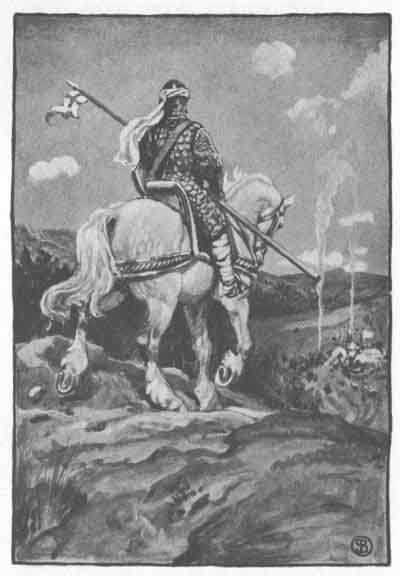
Ganelon Rides Away
Chapter Thirteen
Scene IV
"You agreed to what?" Marsilla was furious.
"My lord, all Karolvs Magnvs requests is that you convert to his faith. In return, he shall see to it that no harm befalls you-"
"And I suppose he still took the money! You fool, you imbecile, you mangy dog! Tomorrow morning I shall see to it that you can no longer call yourself my-" Suddenly, a group of actors burst onto the stage cheering loudly. One of them approached Marsilla.
"Hail Marsilla, saviour of Saragossa!" The actor went back to his position at the back of the stage and was replaced by another member of the troupe.
"Hail Marsilla the Wise, protector of our freedom!" Again, the actor went to the back of the stage, and another stepped forward.
"Hail Marsilla, the equal of Karolvs Magnvs!" Marsilla turned to the vizier and addressed him, speaking through gritted teeth.
"It seems, al-Rahman, your diplomacy has actually helped my reputation. You are excused, this time. But let me warn you, if you dare act without my permission again I shall flay you alive!"
"Yes, my lord." The actors all exited the stage, except one, who stayed to address the audience.
"My lords and ladies, the first part of our epic tale draws to a close. Pray, stay for the second, and delve further into this fine tale!" The actor then joined his colleagues off stage.
Act II
Scene I
Scene I
Four actors returned to the stage, dressed in elaborate costumes representing Charlemagne's paladins. Charlemagne spoke first.
"My trusted paladins, I grow tired of this war, let us make haste and return to dear Francia." A cry of 'hear hear' came from the paladins.
"My lord, surely we must send a messenger to the Muslims to announce our withdrawal from their lands?" The speaker was Roland, one of *Charlemagne's most trusted knights.
"Of course, Roland. Pray, who would you suggest we send?"
"Well, my lord, my stepfather Ganelon would be only too willing to oblige. Why not send him?"
"Ganelon, yes, I shall send him to Marsilla on the morrow. Tonight, my dear friends, we shall sleep well, knowing that dear Francia awaits with open arms!" The four actors quit the stage. Their was a brief applause from the audience, as two more actors entered the stage.

Charlemagne and his paladins.
Scene II
"That bastard! How dare he suggest I be the one to deliver our message of withdrawal? Surely I will be eaten alive by those ravenous pagans! No, I see it now - that is that bastard Roland's plan! He wishes me dead, the perfect revenge for my hatred of him for all these long years. I think a plan is in need of development..." The two actors exited the stage, and were replaced, again, by Charlemagne and his paladins.
Scene III
"Ganelon has left for Saragossa, my lord, our message should be received by this evening."
"Excellent. How about a spot of wine as celebration for our imminent return?" Charlemagne's offer of wine was met by cheers from the paladins.
"A toast, for God, for the Emperor, and for Francia!" The paladins raised their tankards, before quitting the stage. Ganelon entered stage left, riding a hobby horse. This brought about a brief burst of laughter from the audience

Ganelon Rides Away
To be continued very soon...
Last edited:
Part Two, Chapter Fourteen, the Frankish play - Act II, Scenes IV, V and VI.
"Why, O Lord, must I suffer in this heat for so long? I am here alone, walking on fearful of an attack by the brutal pagans. O Lord, pray, send me assistance. Show me the way out of my situation!" Ganelon was addressing his Lord loudly. Suddenly, another actor burst ont the stage.
"Halt, heathen. Give up your valuables or face the wrath of my Saracen army." Ganelon smiled, his plan had worked.
"Pray, heathen, spare me, and I can offer information on how to defeat your scourge, Charlemagne." The actor playing the Saracen gave a wry smile and led Ganelon back to his camp. As the two actors exited stage, they spoke in hushed whispers in audible to the audience.
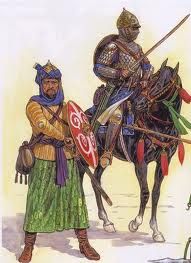
A Saracen, such as the one who ambushed Ganelon.
"Faithful paladins, today we ride for Francia!" A cheer erupted from the paladin actors. Charlemagne took Roland to one side. "Roland, I would like you to lead my rear guard to protect us against any Saracen raiders."
"Of course, my lord."
"Now, my knights, to Francia!" The actors exited stage right. Ganelon and the Saracens entered the stage.
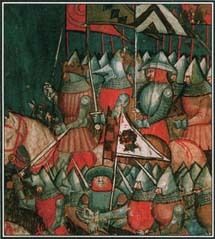
The Paladins riding for Francia
"You are sure your plan will work, heathen?"
"Yes. My lord would not travel without a rear guard, and they will be vulnerable in the mountain passes."
"This better work, heathen." Roland enters stage left along with two other actors.
"Look, the rear guard will be soon upon us."
"Oliver, Turpin, look - a Saracen army in the distance! We must be wary, for they may seek to ambush us."
"I say we engage them for the glory of God!"
"No, Turpin, we must stay clear and hope with do not get attacked." Oliver, a wise man, tried to calm the zealous Archbishop Turpin.
"I agree, we must endeavour to stay out of conflict, Turpin. It would not be wise to attack." The three actors continued towards stage right. The focus shifted to Ganelon and the Saracens.
"Look, they approach. Be careful not to arouse their suspicions."
"Yes, heathen."
"Remember, when we attack, we must draw them onto us. Attack first with only a few of our men, then let the rest of the force enter the fray."
"Yes, heathen." The focus now moved back to Roland, Oliver and Turpin.
"Look, is that Ganelon? He must have got himself lost on his way to Saragossa, the fool. Ganelon, ho there!" The focus changed once more to Ganelon and the Saracens.
"We must strike now, they do not suspect a thing."
"Yes, heathen." A mock fight breaks out on stage, with more actors entering from stage right and stage left. Many actors lay on the floor - more of them Christian than Saracen. There were gasps from the audience as the focus shifted to Oliver.
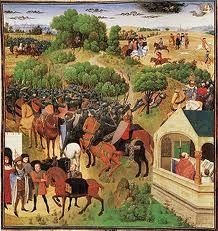
The battle at Saragossa
"Roland, I beseech you, blow the olifant, we are in dire need of help."
"Have faith, my friend, the Lord will protect us against these heathens, and our army shall pull through as victors!" There was more fighting. The Franks fought courageously, and demonstrated their superior military ability, but still found themselves losing.
"Roland, let pride blind you no longer - call for help. Though it may be too late already to turn this battle's tide, let our great emperor see what fate has befallen us, and let us pray that he may avenge our deaths."
"Oliver, you are my most trusted friend for a reason, I shall blow for help, and may God let it be so that it arrives with haste." The actor playing Roland produced a horn from his costume, and blew on it loudly. He then fell to the floor, dying. The actor portraying Oliver also fell to the floor dead.
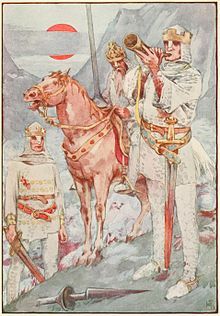
Roland blows the olifant
"Mine head hurts so, I fear soon I shall be no longer of this world. Oliver, are you still here, or has my cruel fate befallen you also? Alas, it cannot be true! My friend, must you be taken from us as well? We shall meet again in Paradise. Yes, I see it now, the angels of the Lord await me. I will go to them, and pray that I may find peace in them. O mortal Earth I leave you a man at peace. Tell mine wife how she is loved, even in death, and tell my emperor how much I respect him, now and always. Dear Lord, I see you now, and I am ready. Take me to thy Kingdom. Let me quit this world, for my part has been played." The actor playing Roland slumped dead onto the floor, before hurrying offstage, along with all the other dead actors. There was a rapturous applause from the audience. Charlemagne and his knights entered stage left, ready to fight the now fleeing Saracens, who made their way slowly to stage right. The Saracens fell to the floor, drowning in the river Ebro. Charlemagne took centre stage
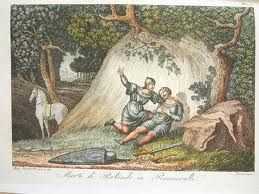
The Death of Roland
i- olifant: Roland's horn, used to call for aid. From an archaic spelling of 'elephant'.
To be continued very soon...
Chapter Fourteen
Scene IV
"Why, O Lord, must I suffer in this heat for so long? I am here alone, walking on fearful of an attack by the brutal pagans. O Lord, pray, send me assistance. Show me the way out of my situation!" Ganelon was addressing his Lord loudly. Suddenly, another actor burst ont the stage.
"Halt, heathen. Give up your valuables or face the wrath of my Saracen army." Ganelon smiled, his plan had worked.
"Pray, heathen, spare me, and I can offer information on how to defeat your scourge, Charlemagne." The actor playing the Saracen gave a wry smile and led Ganelon back to his camp. As the two actors exited stage, they spoke in hushed whispers in audible to the audience.

A Saracen, such as the one who ambushed Ganelon.
Scene V
"Faithful paladins, today we ride for Francia!" A cheer erupted from the paladin actors. Charlemagne took Roland to one side. "Roland, I would like you to lead my rear guard to protect us against any Saracen raiders."
"Of course, my lord."
"Now, my knights, to Francia!" The actors exited stage right. Ganelon and the Saracens entered the stage.

The Paladins riding for Francia
Scene VI
"You are sure your plan will work, heathen?"
"Yes. My lord would not travel without a rear guard, and they will be vulnerable in the mountain passes."
"This better work, heathen." Roland enters stage left along with two other actors.
"Look, the rear guard will be soon upon us."
"Oliver, Turpin, look - a Saracen army in the distance! We must be wary, for they may seek to ambush us."
"I say we engage them for the glory of God!"
"No, Turpin, we must stay clear and hope with do not get attacked." Oliver, a wise man, tried to calm the zealous Archbishop Turpin.
"I agree, we must endeavour to stay out of conflict, Turpin. It would not be wise to attack." The three actors continued towards stage right. The focus shifted to Ganelon and the Saracens.
"Look, they approach. Be careful not to arouse their suspicions."
"Yes, heathen."
"Remember, when we attack, we must draw them onto us. Attack first with only a few of our men, then let the rest of the force enter the fray."
"Yes, heathen." The focus now moved back to Roland, Oliver and Turpin.
"Look, is that Ganelon? He must have got himself lost on his way to Saragossa, the fool. Ganelon, ho there!" The focus changed once more to Ganelon and the Saracens.
"We must strike now, they do not suspect a thing."
"Yes, heathen." A mock fight breaks out on stage, with more actors entering from stage right and stage left. Many actors lay on the floor - more of them Christian than Saracen. There were gasps from the audience as the focus shifted to Oliver.

The battle at Saragossa
"Roland, I beseech you, blow the olifant, we are in dire need of help."
"Have faith, my friend, the Lord will protect us against these heathens, and our army shall pull through as victors!" There was more fighting. The Franks fought courageously, and demonstrated their superior military ability, but still found themselves losing.
"Roland, let pride blind you no longer - call for help. Though it may be too late already to turn this battle's tide, let our great emperor see what fate has befallen us, and let us pray that he may avenge our deaths."
"Oliver, you are my most trusted friend for a reason, I shall blow for help, and may God let it be so that it arrives with haste." The actor playing Roland produced a horn from his costume, and blew on it loudly. He then fell to the floor, dying. The actor portraying Oliver also fell to the floor dead.

Roland blows the olifant
"Mine head hurts so, I fear soon I shall be no longer of this world. Oliver, are you still here, or has my cruel fate befallen you also? Alas, it cannot be true! My friend, must you be taken from us as well? We shall meet again in Paradise. Yes, I see it now, the angels of the Lord await me. I will go to them, and pray that I may find peace in them. O mortal Earth I leave you a man at peace. Tell mine wife how she is loved, even in death, and tell my emperor how much I respect him, now and always. Dear Lord, I see you now, and I am ready. Take me to thy Kingdom. Let me quit this world, for my part has been played." The actor playing Roland slumped dead onto the floor, before hurrying offstage, along with all the other dead actors. There was a rapturous applause from the audience. Charlemagne and his knights entered stage left, ready to fight the now fleeing Saracens, who made their way slowly to stage right. The Saracens fell to the floor, drowning in the river Ebro. Charlemagne took centre stage

The Death of Roland
i- olifant: Roland's horn, used to call for aid. From an archaic spelling of 'elephant'.
To be continued very soon...
Last edited:
If you've devoted this much to this version of Chanson de Roland, is the play some sort of foreshadowing or otherwise connected to future updates?
If you've devoted this much to this version of Chanson de Roland, is the play some sort of foreshadowing or otherwise connected to future updates?
That would definitely come into it. I also see the choice of play as another outlet to demonstrate Herbert's obsession with his family, reminding the guests at his feast that his grandfathers are the subjects of great tales, perhaps to compensate for the fact that he knows he hasn't done all that much with his life so far...
The ironic thing is that the poem is named after Roland and not Herbert's ancestor....That would definitely come into it. I also see the choice of play as another outlet to demonstrate Herbert's obsession with his family, reminding the guests at his feast that his grandfathers are the subjects of great tales, perhaps to compensate for the fact that he knows he hasn't done all that much with his life so far...
Dovahkiing said:The ironic thing is that the poem is named after Roland and not Herbert's ancestor....
Even so, Charlemagne features (if only briefly). If you notice, Adelbert's horse is also called Roland. I tend to see him as the more paladin-like character.
Another excellent couple of updates, you weave in the tale being told in the play as its own story very nicely, whilst still keeping it clearly within the main story you're telling. And it's always a good idea to remind others that you've got some History when it comes to the family, so to speak! 
Another excellent couple of updates, you weave in the tale being told in the play as its own story very nicely, whilst still keeping it clearly within the main story you're telling. And it's always a good idea to remind others that you've got some History when it comes to the family, so to speak!
And what a history at that! Mind you, we (us Europeans, anyway) are all descended from Charlemagne apparently. I guess in that respect, Herbert would be some kind of great uncle
Thanks for the comments, they're much appreciated.
Part Two, Chapter Fifteen, the Frankish play -Scene VII, Act III, Scenes I, II and...
"Mine most faithful knights, why have you been taken from me most cruelly. Fear not, you may find eternal rest now that your deaths have been avenged. The traitor Ganelon shall be held in chains for his misdeeds until we arrive back in Aix. I hope that you find solace in the Lord. May peace be with you, my warriors. Requiescat in pace." Charlemagne and his knights exited stage right, with Ganelon dragged behind them in chains. An actor stayed behind, and took centre stage to address the audience.
"Lords and ladies, our brave paladins have been slain, but fear not, for our tale does not meet the same fate. Follow us now as we embark upon part the third - may I present, the defeat of evil in all its forms." There was a short applause from the audience.
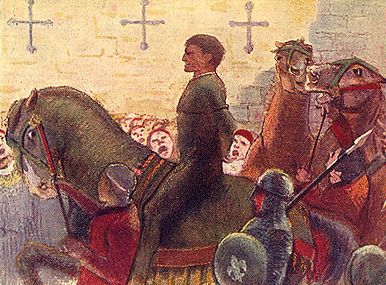
Ganelon is led away.
"May I present Baligant, the emir of Babylon." The actor was dressed as a herald, and was one of three actors onstage - the other tow being Baligant and Marsilla.
"Baligant, what an unexpected visit this is! What may I do for you?"
"It is I, Marsilla, who is here to do something for you. I have brought with me my armies to aid you in your struggle against the heathen Karolvs Magnvs."
"Ah, yes, my struggle," at this point, Marsilla turned to the audience, who laughed, "let our enemies tremble!"
"Indeed, we shall meet them at Roncevalles to tomorrow,"
"Yes, we shall." Marsilla looked worried, before turning to the audience, who gave out a short laugh. Charlemagne and his armies entered stage right, while Baligant and Marsilla exited stage left.
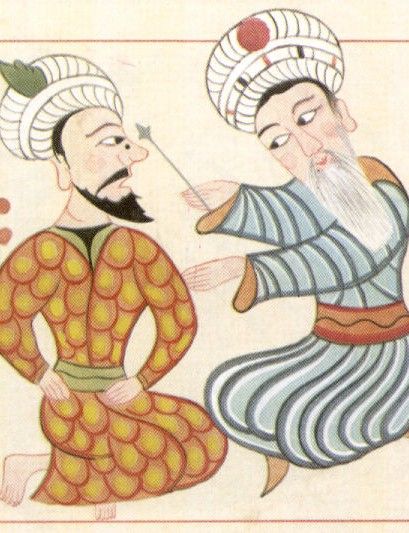
Baligant and Marsilla
"Why must it be that our sacrifice is so great?" Charlemagne stood centre stage, while other actors mimed burying dead behind him. They all looked grave. Suddenly, one of the actors looked up.
"Look, my lord, a large army approaches!"
"What treachery is this? Do not tarry, men, we must strike these heathens!" The actors onstage stopped burying the dead, and prepared themselves for battle. Baligant and Marsilla entered stage left, with five other actors behind them.
"Such deceit! Marsilla, you swine, you agreed peace with me not three days ago!" A battle broke out between the two side, with Charlemagne killing Marsilla and Baligant personally.
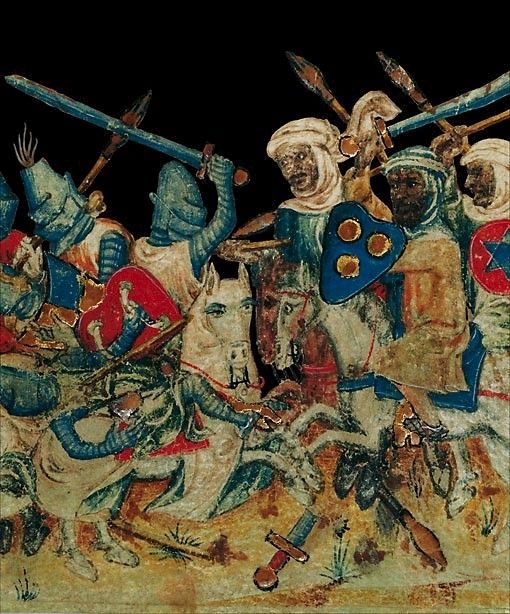
The battle of Roncevalles
"Now the world can breath once more, as it is rid of such traitorous fools." An actor dressed as a woman approached Charlemagne.
"O emperor, you have slain my husband. Pray, take me with you to your glorious domain and teach me the ways of your Lord God."
"It shall be done, my lady, but first we must ride to Saragossa and liberate it from the clutches of the infidels." The actors exited stage left to an applause by the audience. A group of actors replaced them on stage, including Charlemagne and Ganelon.
"Ganelon, you are hereby accused of treason against Roland, a most noble and courageous knight in the service of our emperor. What excuses do you give for your actions?"
"My acts were openly professed, and was legitimate revenge. I have committed no treason." There were general murmurs of agreement from the actors in the jury. One jury member, Thierry, speaks out.
"Ganelon, Roland was in the service of the emperor when you exacted your revenge. Surely then, you have committed treason against the emperor himself in the murder of his most trusted knight?" Again, there were general murmurs of agreement from the jury, who had been swayed again. Pinable, a friend of Ganelon's, spoke out.
"Thierry, your claims are foolish. I challenge you to a duel - if you win, you are right and Ganelon shall be punished, if I am the victor, he shall be set free." The jury gasped as each man drew a sword. Thierry could be seen praying. Pinabel began the duel, which continued for a good few minutes. Pinabel, the stronger of the two, seemed to be winning. Just as he was about to deliver the finishing blow, Thierry parries his attack and takes the offensive. It was clear that the Lord had intervened in the name of justice. Pinabel fell dead, stabbed by Thierry. There were cheers as he was crowned the victor. The focus returned to the trial.
"Ganelon, we find you guilty of treason against Roland, and against the emperor. We hereby sentence you to a most painful death, and sentence thirty of your relatives to be hanged." Ganelon was led away, before being unchained and pulled apart by horses. He then exited stage. The audience gave an enthusiastic applause, as the actors all returned to the stage for their bows. One actor took centre stage to address the audience for a final time.
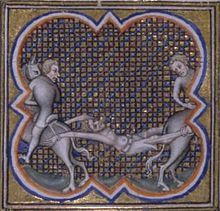
The Death of Ganelon
"Our tale now comes to a close, and justice prevails once more. My lords and ladies, we hope that you have been entertained this evening, and bid you farewell for now." There was a final applause, as the actors exited stage left en masse.
We now return to extracts from the work of de Compiègne.
"But we cannot serve the guests yet, Benoît, Raoul has still not arrived. Surely, we could not let the celebrations start without a guest if honour?"
"Certainly, my lord, but I have revived word from your servants that the meal is ready, and I would not want it to go cold."
"As normal, Benoît, you are right. We must serve the food now. Raoul will be the one missing out, after all!" The two men laughed, before Benoît left to go and alert the cooks that the food should be sent to the hall. Herbert bid his friend goodbye, before turning to face a page who had approached his master.
"Sir, another guest has just arrived. He is sodden after having travelled through tonight's storm, and asks if he may be given a change of clothes?"
"And who is this guest, boy?"
"He says he is Raoul, comte de Amiens et Vexin, baron de Péronne." Herbert let out a small laugh, as he went with his page to greet his final guest.
Chapter Fifteen
Scene VII
"Mine most faithful knights, why have you been taken from me most cruelly. Fear not, you may find eternal rest now that your deaths have been avenged. The traitor Ganelon shall be held in chains for his misdeeds until we arrive back in Aix. I hope that you find solace in the Lord. May peace be with you, my warriors. Requiescat in pace." Charlemagne and his knights exited stage right, with Ganelon dragged behind them in chains. An actor stayed behind, and took centre stage to address the audience.
"Lords and ladies, our brave paladins have been slain, but fear not, for our tale does not meet the same fate. Follow us now as we embark upon part the third - may I present, the defeat of evil in all its forms." There was a short applause from the audience.

Ganelon is led away.
Act III
Scene I
Scene I
"May I present Baligant, the emir of Babylon." The actor was dressed as a herald, and was one of three actors onstage - the other tow being Baligant and Marsilla.
"Baligant, what an unexpected visit this is! What may I do for you?"
"It is I, Marsilla, who is here to do something for you. I have brought with me my armies to aid you in your struggle against the heathen Karolvs Magnvs."
"Ah, yes, my struggle," at this point, Marsilla turned to the audience, who laughed, "let our enemies tremble!"
"Indeed, we shall meet them at Roncevalles to tomorrow,"
"Yes, we shall." Marsilla looked worried, before turning to the audience, who gave out a short laugh. Charlemagne and his armies entered stage right, while Baligant and Marsilla exited stage left.

Baligant and Marsilla
Scene II
"Why must it be that our sacrifice is so great?" Charlemagne stood centre stage, while other actors mimed burying dead behind him. They all looked grave. Suddenly, one of the actors looked up.
"Look, my lord, a large army approaches!"
"What treachery is this? Do not tarry, men, we must strike these heathens!" The actors onstage stopped burying the dead, and prepared themselves for battle. Baligant and Marsilla entered stage left, with five other actors behind them.
"Such deceit! Marsilla, you swine, you agreed peace with me not three days ago!" A battle broke out between the two side, with Charlemagne killing Marsilla and Baligant personally.

The battle of Roncevalles
"Now the world can breath once more, as it is rid of such traitorous fools." An actor dressed as a woman approached Charlemagne.
"O emperor, you have slain my husband. Pray, take me with you to your glorious domain and teach me the ways of your Lord God."
"It shall be done, my lady, but first we must ride to Saragossa and liberate it from the clutches of the infidels." The actors exited stage left to an applause by the audience. A group of actors replaced them on stage, including Charlemagne and Ganelon.
Scene III
"Ganelon, you are hereby accused of treason against Roland, a most noble and courageous knight in the service of our emperor. What excuses do you give for your actions?"
"My acts were openly professed, and was legitimate revenge. I have committed no treason." There were general murmurs of agreement from the actors in the jury. One jury member, Thierry, speaks out.
"Ganelon, Roland was in the service of the emperor when you exacted your revenge. Surely then, you have committed treason against the emperor himself in the murder of his most trusted knight?" Again, there were general murmurs of agreement from the jury, who had been swayed again. Pinable, a friend of Ganelon's, spoke out.
"Thierry, your claims are foolish. I challenge you to a duel - if you win, you are right and Ganelon shall be punished, if I am the victor, he shall be set free." The jury gasped as each man drew a sword. Thierry could be seen praying. Pinabel began the duel, which continued for a good few minutes. Pinabel, the stronger of the two, seemed to be winning. Just as he was about to deliver the finishing blow, Thierry parries his attack and takes the offensive. It was clear that the Lord had intervened in the name of justice. Pinabel fell dead, stabbed by Thierry. There were cheers as he was crowned the victor. The focus returned to the trial.
"Ganelon, we find you guilty of treason against Roland, and against the emperor. We hereby sentence you to a most painful death, and sentence thirty of your relatives to be hanged." Ganelon was led away, before being unchained and pulled apart by horses. He then exited stage. The audience gave an enthusiastic applause, as the actors all returned to the stage for their bows. One actor took centre stage to address the audience for a final time.

The Death of Ganelon
"Our tale now comes to a close, and justice prevails once more. My lords and ladies, we hope that you have been entertained this evening, and bid you farewell for now." There was a final applause, as the actors exited stage left en masse.
Fin.
We now return to extracts from the work of de Compiègne.
"But we cannot serve the guests yet, Benoît, Raoul has still not arrived. Surely, we could not let the celebrations start without a guest if honour?"
"Certainly, my lord, but I have revived word from your servants that the meal is ready, and I would not want it to go cold."
"As normal, Benoît, you are right. We must serve the food now. Raoul will be the one missing out, after all!" The two men laughed, before Benoît left to go and alert the cooks that the food should be sent to the hall. Herbert bid his friend goodbye, before turning to face a page who had approached his master.
"Sir, another guest has just arrived. He is sodden after having travelled through tonight's storm, and asks if he may be given a change of clothes?"
"And who is this guest, boy?"
"He says he is Raoul, comte de Amiens et Vexin, baron de Péronne." Herbert let out a small laugh, as he went with his page to greet his final guest.
To be continued very soon...
Last edited:
It would be pretty cool if Ganelon turned out to be a foreshadowing for someone betraying Herbert, perhaps Raoul....
It would be pretty cool if Ganelon turned out to be a foreshadowing for someone betraying Herbert, perhaps Raoul....
Wouldn't it just...
Part Three, Chapter Sixteen - a good man goes to war.
Taken from the work of de Compiègne.
Two months had passed since the events at Laon. Herbert stood with Benoît in the study at Rethel.
"My lord, the news is correct."
"The fool. He must know inside him that he stands no chance against the king-"
"As it may appear, my lord, but the king's power lies largely with a select few - including ourselves. We have known for years that the realm is too decentralised."
"You must stop making me look a fool, Benoît!" the count joked, "We all know of your wisdom and wit. I fear, though, you are right. You know that I would support Philippe until the last, but he is a fool for allowing such large powers in his realm. We all know of Aquitaine and Toulouse to the south. And now Burgundy! Has his stance been formalised?"
"Not yet, my lord. It is expected that we will be called to levy the soldiers any day now. The duke has long been a careful man - I see no reason that should not continue."
"Quite." Benoît bade Herbert farewell, and began in his way back to Laon. Once his friend was gone, Herbert returned to his reading.
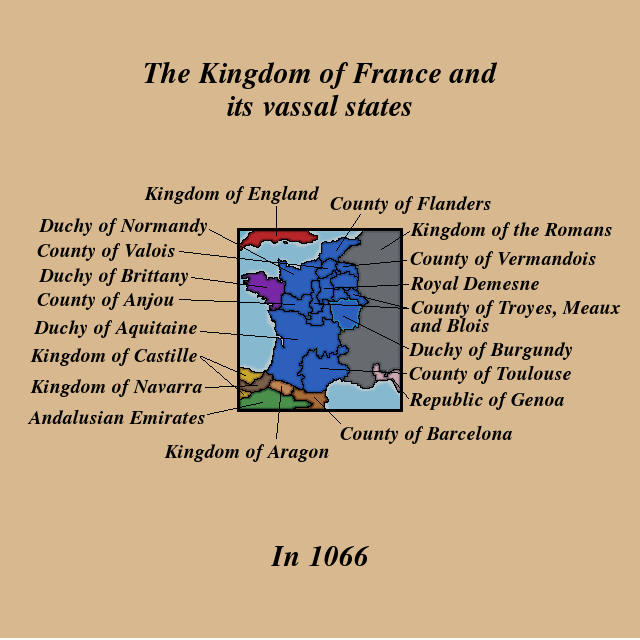
The political situation in France in 1066. Note the relative scale of the royal demense and the vassal states, and also the size of vassals such as the Duchy of Aquitaine and the County of Toulouse. It was this political uncertainty that was the catalyst for the events that would shape France as a nation. The Duchy of Burgundy has been highlighted.
Adalbert arrived at Rethel sometime in the early evening. He had been sent for by Herbert, who wished to discuss the matter of war with his most trusted knight. Herbert, not the bravest ruler of the time, admired his friend's strength and piety, and considered him the finest military mind in Vermandois. Humble as the knight was, though, he had grown used to rejecting Herbert's offers of council positions.
Adalbert was shown in by a young servant boy, and was greeted by Eudes in the stone castle entranceway.
"Hello, my lad." Eudes got on well with his father's friend, who saw Adalbert as an avuncular figure.
"Hello, Adalbert. I think father is in his study."
"Thank you, although I might have guessed as much. Is he still occupying himself with his history books?"
"I think so. Hopefully you won't disturb him." Adalbert laughed.
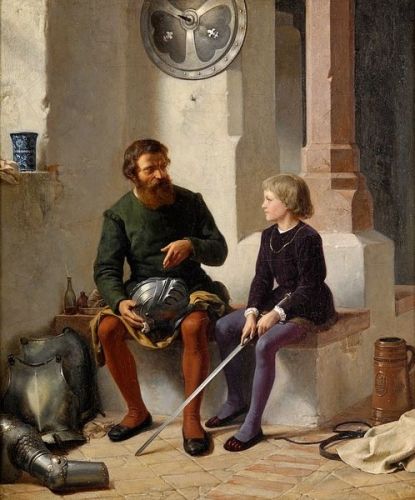
Adalbert and Eudes, painted at a later date.
"Indeed, my boy." Adalbert continued on though the castle before reaching Herbert's study. He knocked on the large, oaken door.
"Enter." Adalbert swung open the door to see his count at his desk.
"Do you ever cease with your devouring of these books, my friend. I fear you will never get around to teaching your boy the art of battle!" Herbert turned around laughing to greet his old friend. At thirty-six years of age, Herbert was looking older. It was as if recent events had taken any vitality out of the count. Over the last few months he had without doubt become a more competent ruler, reinvigorated by a renewed sense of belonging to his name. Though it was obvious he was growing weary - shutting himself away with his books and seeing less of the world each day. There was rumour amongst the peasantry that he was not long for this world, but any such mutterings were quickly dismissed by the more hedonistic courtiers of the realm who could often be found indulging in local taverns.
"My friend," Herbert addressed Adalbert, "it is obvious why I have requested to see you. Even if you do not accept so formally, you shall always be the military genius of this realm, and I therefore need to consult with you on the possibility of an attack. As you know, Robert the Old Bastard lies just to the south, so we should prepare ourselves, I'd imagine?"
"Quite right, my lord-"
"Please, Adalbert, I grow weary of such formalities amongst friends."
"My apologies. Though you are quite right. Our lands have not been as heavily invested in as their more central counterparts, so should expect an attack from an opportunistic general."
"And the troops - should we fight, or wait for the call from Philippe?"
"Wait, my friend. We could levy maybe ten-score men, a few more if we had the sufficient coin, but we must leave these matters to Philippe. He may be young, but we must find faith in him."
"Quite right, my friend. What are we creatures without our faith?"
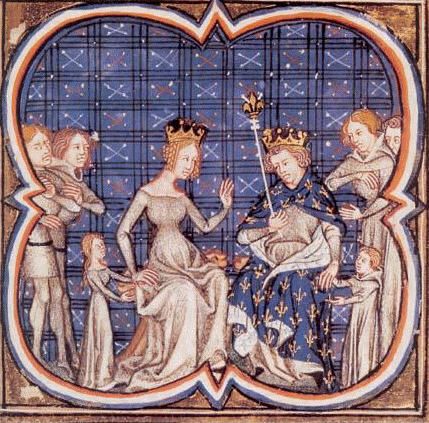
An older Philippe with his son Louis.
i - the Old Bastard: Robert was popularly known as 'the Old.
Part Three
Part three, taken from the works of de Compiègne, with some additional material from the following publications:
-A Lyrical History of the Lady Francia (degli Alberighi, 1370)
-The Young Man and the Fool - On the Burgundian Revolt of 1066 (Thacker, 1978)
Used with the kind permission of the authors.
-A Lyrical History of the Lady Francia (degli Alberighi, 1370)
-The Young Man and the Fool - On the Burgundian Revolt of 1066 (Thacker, 1978)
Used with the kind permission of the authors.
"There is a tide in the affairs of men.
Which, taken at the flood, leads on to fortune;
Omitted, all the voyage of their life
Is bound in shallows and in miseries.
On such a full sea are we now afloat,
And we must take the current when it serves,
Or lose our ventures." - Shakespeare, Julius Caesar
Which, taken at the flood, leads on to fortune;
Omitted, all the voyage of their life
Is bound in shallows and in miseries.
On such a full sea are we now afloat,
And we must take the current when it serves,
Or lose our ventures." - Shakespeare, Julius Caesar
Chapter Sixteen
Taken from the work of de Compiègne.
Two months had passed since the events at Laon. Herbert stood with Benoît in the study at Rethel.
"My lord, the news is correct."
"The fool. He must know inside him that he stands no chance against the king-"
"As it may appear, my lord, but the king's power lies largely with a select few - including ourselves. We have known for years that the realm is too decentralised."
"You must stop making me look a fool, Benoît!" the count joked, "We all know of your wisdom and wit. I fear, though, you are right. You know that I would support Philippe until the last, but he is a fool for allowing such large powers in his realm. We all know of Aquitaine and Toulouse to the south. And now Burgundy! Has his stance been formalised?"
"Not yet, my lord. It is expected that we will be called to levy the soldiers any day now. The duke has long been a careful man - I see no reason that should not continue."
"Quite." Benoît bade Herbert farewell, and began in his way back to Laon. Once his friend was gone, Herbert returned to his reading.

The political situation in France in 1066. Note the relative scale of the royal demense and the vassal states, and also the size of vassals such as the Duchy of Aquitaine and the County of Toulouse. It was this political uncertainty that was the catalyst for the events that would shape France as a nation. The Duchy of Burgundy has been highlighted.
Adalbert arrived at Rethel sometime in the early evening. He had been sent for by Herbert, who wished to discuss the matter of war with his most trusted knight. Herbert, not the bravest ruler of the time, admired his friend's strength and piety, and considered him the finest military mind in Vermandois. Humble as the knight was, though, he had grown used to rejecting Herbert's offers of council positions.
Adalbert was shown in by a young servant boy, and was greeted by Eudes in the stone castle entranceway.
"Hello, my lad." Eudes got on well with his father's friend, who saw Adalbert as an avuncular figure.
"Hello, Adalbert. I think father is in his study."
"Thank you, although I might have guessed as much. Is he still occupying himself with his history books?"
"I think so. Hopefully you won't disturb him." Adalbert laughed.

Adalbert and Eudes, painted at a later date.
"Indeed, my boy." Adalbert continued on though the castle before reaching Herbert's study. He knocked on the large, oaken door.
"Enter." Adalbert swung open the door to see his count at his desk.
"Do you ever cease with your devouring of these books, my friend. I fear you will never get around to teaching your boy the art of battle!" Herbert turned around laughing to greet his old friend. At thirty-six years of age, Herbert was looking older. It was as if recent events had taken any vitality out of the count. Over the last few months he had without doubt become a more competent ruler, reinvigorated by a renewed sense of belonging to his name. Though it was obvious he was growing weary - shutting himself away with his books and seeing less of the world each day. There was rumour amongst the peasantry that he was not long for this world, but any such mutterings were quickly dismissed by the more hedonistic courtiers of the realm who could often be found indulging in local taverns.
"My friend," Herbert addressed Adalbert, "it is obvious why I have requested to see you. Even if you do not accept so formally, you shall always be the military genius of this realm, and I therefore need to consult with you on the possibility of an attack. As you know, Robert the Old Bastard lies just to the south, so we should prepare ourselves, I'd imagine?"
"Quite right, my lord-"
"Please, Adalbert, I grow weary of such formalities amongst friends."
"My apologies. Though you are quite right. Our lands have not been as heavily invested in as their more central counterparts, so should expect an attack from an opportunistic general."
"And the troops - should we fight, or wait for the call from Philippe?"
"Wait, my friend. We could levy maybe ten-score men, a few more if we had the sufficient coin, but we must leave these matters to Philippe. He may be young, but we must find faith in him."
"Quite right, my friend. What are we creatures without our faith?"

An older Philippe with his son Louis.
i - the Old Bastard: Robert was popularly known as 'the Old.
To be continued very soon...
Last edited:
Eh. Support the Burgundians instead, why are you aiding the heir of the usurper Hugh?
Last edited:
Eh. Support the Burgundians instead, why are you aiding the heir of the usurper Hugh?
Patience... We shall bring them down from within
Last edited:
Part Three, Chapter Seventeen, the young man and the fool.
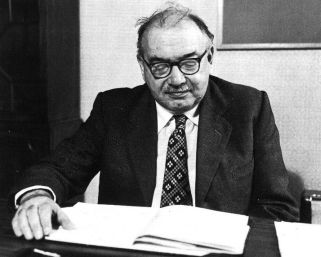
Professor William Thacker
In November 1066, Duke Robert I 'the Old' of Burgundy, the younger son of Robert II of France, sent word to his nephew the king, the young Philippe I, who was only 14 years old when war was declared. Some extracts from Robert's declaration exist today. Below is a transcribed version of one of the more vital sections:
From this letter, we see only a small part of the hatred it is apparent Robert had of his nephew, who he refused to accept as king. No one can know for sure his exact motives for declaring war upon his nominal king, but it appears that he was fighting for the right to exist as an independent sovereign state, as is hinted at in the third line of the above extract[...]
The war started well for the duke, who was able to march quickly to defend his lands - defeating his nephew at Dijon and Troyes. The next battle, however, which was fought a few days later at Auxerre, turned the tide, and signalled a period of Frankish domination in the conflict. Though the war lasted a good three years, the momentum was with the French from the start, and the sieges required for the stubborn Robert to admit defeat were no more than a formality[...]
Robert finally recognised his defeat in early 1070, quickly finding himself imprisoned by the king, who showed him no mercy. Were it not for the fact that this war represents the decentralisation of the mid Capetian rule, this war would be minor, and would probably not be remembered in history. The significance it has in exposing the fundamental political flaws in the mid Capetian administration, however, ensures that the 'War against the tyranny of King Philippe', as it has come to be known, will live on as an example of the troubles of medieval politics in France, and the struggles the earlier kings had in establishing a level of authority[...]
In the month of November, in the year of our lord one-thousand and sixty-six, duke Robert 'the Old' did declare his independence from his nominal liege, Phillipe I of France, Capetian king of the Frankish lands. Whilst not directly involved, Herbert did find himself embroiled in the conflict as commander of his levied forces from Vermandois.
"Adalbert, send out the calls to all able men of the area. We shall muster in the grounds of the castle."
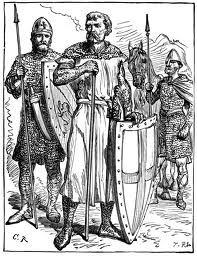
A sketch of soldiers like those levied by Philippe for the war.
"Of course." Herbert watched as Adalbert rode off to Rethel, his horse Roland shrinking slowly into the morning sun. For a November day, it was rather warm - not the type of day on which war should be declared. It was not yet formal, but all the lords around the country, excepting those unlucky enough to have sworn fealty to the bastard Robert, we're readying their levies in anticipation. A young page approached Herbert.
"My lord, word has been received from Benoît de Laon. He wishes to inform you that he will be arriving at the castle later today, and should already be travelling."
"Thank you." Herbert dismissed the young lad and watched him return to the castle. He looked no more than fifteen years old, just held back by his minority. I wonder if he is envious of my soldiers, thought Herbert. The count was not the most battle-hardened man in the realm, but did not shirk from his duty to his liege, whoever he may be. He wondered if his page was the same.
The count was distracted by his son approaching.
"Father, do you ride today?"
"I do not know yet, my boy. Adalbert is as we speak levying the men of the realm. Imagine we will not be long in going to battle."
"Father, will you bring me a trophy?"
"My son, I shall bring you the trophy of having a father who is loyal to his liege. You do not need some bloodied weapon dragged from the hand of a dead man." Eudes was disappointed, but did not complain. Herbert sensed there was something wrong. "Do not worry my boy, for very soon you shall be able to ride to battle for yourself, and can win a trophy of your own." Hearing this, Eudes bade his father farewell, and returned to the castle, where his mother was undoubtedly waiting for him.
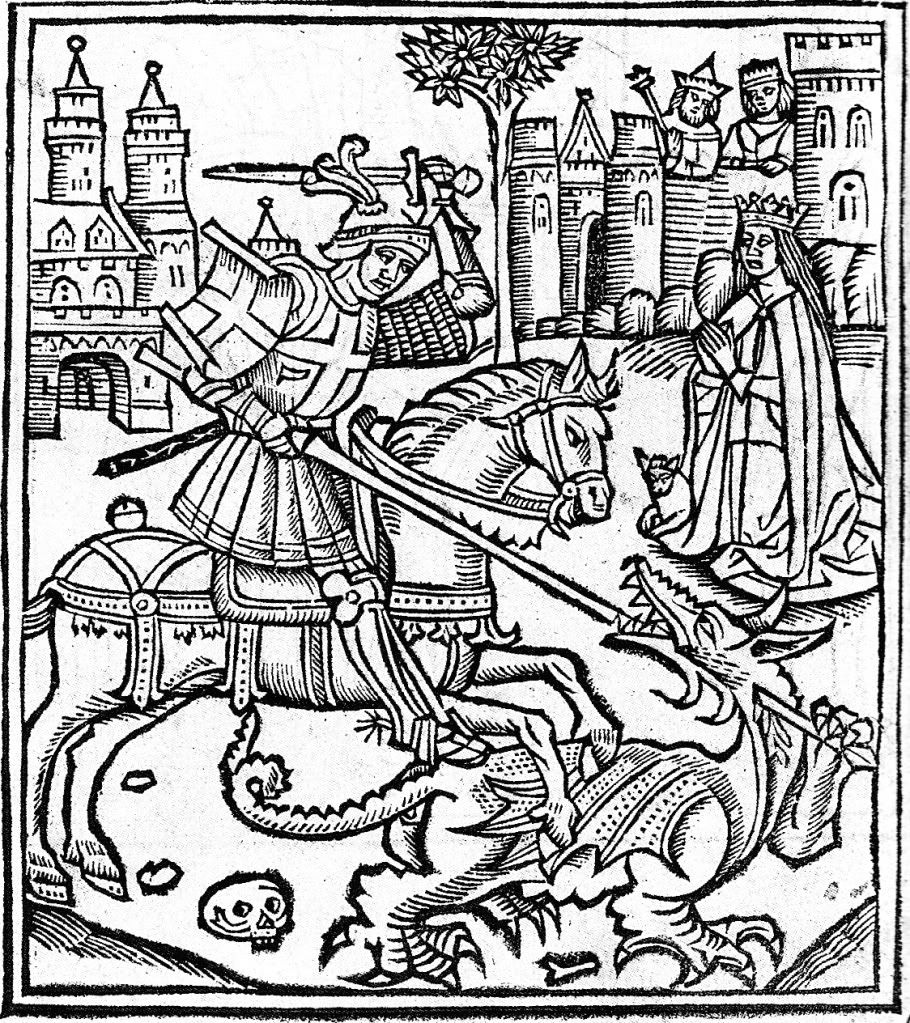
A highly exaggerated sketch showing Herbert leaving for battle. Alix-Adèle is shown in the background, with Duke Robert portrayed as a dragon, being slain by Herbert.
To be continued very soon...
*Coincidentally, that actually is a picture of a Professor William Thacker. It turns out he was a teacher at Durham University
Chapter Seventeen
The following extract is taken from The Young Man and the Fool - On the Burgundian Revolt of 1066. The Young Man and the Fool was written by Professor William Thacker in 1978, who is one of the world's leading experts of medieval France, especially pre-Karling. All text is used with the kind permission of the author.

Professor William Thacker
In November 1066, Duke Robert I 'the Old' of Burgundy, the younger son of Robert II of France, sent word to his nephew the king, the young Philippe I, who was only 14 years old when war was declared. Some extracts from Robert's declaration exist today. Below is a transcribed version of one of the more vital sections:
"My king, or rather, my nephew. From this moment forth, you shall be only associated with me through blood, for I have seen fit to make my objections to your tyranny and usurpation clear in declaring war upon you. You are no longer my liege lord, and I will maintain such even if I must die meeting you in combat to ensure such an arrangement for my descendants..."
From this letter, we see only a small part of the hatred it is apparent Robert had of his nephew, who he refused to accept as king. No one can know for sure his exact motives for declaring war upon his nominal king, but it appears that he was fighting for the right to exist as an independent sovereign state, as is hinted at in the third line of the above extract[...]
The war started well for the duke, who was able to march quickly to defend his lands - defeating his nephew at Dijon and Troyes. The next battle, however, which was fought a few days later at Auxerre, turned the tide, and signalled a period of Frankish domination in the conflict. Though the war lasted a good three years, the momentum was with the French from the start, and the sieges required for the stubborn Robert to admit defeat were no more than a formality[...]
Robert finally recognised his defeat in early 1070, quickly finding himself imprisoned by the king, who showed him no mercy. Were it not for the fact that this war represents the decentralisation of the mid Capetian rule, this war would be minor, and would probably not be remembered in history. The significance it has in exposing the fundamental political flaws in the mid Capetian administration, however, ensures that the 'War against the tyranny of King Philippe', as it has come to be known, will live on as an example of the troubles of medieval politics in France, and the struggles the earlier kings had in establishing a level of authority[...]
We now return to the work of de Compiègne. What is interesting about this extract is that is one of few in de Compiègne's chronicles that offers some context outside of the rather small subject of the Herbert within Capetian France.
In the month of November, in the year of our lord one-thousand and sixty-six, duke Robert 'the Old' did declare his independence from his nominal liege, Phillipe I of France, Capetian king of the Frankish lands. Whilst not directly involved, Herbert did find himself embroiled in the conflict as commander of his levied forces from Vermandois.
"Adalbert, send out the calls to all able men of the area. We shall muster in the grounds of the castle."

A sketch of soldiers like those levied by Philippe for the war.
"Of course." Herbert watched as Adalbert rode off to Rethel, his horse Roland shrinking slowly into the morning sun. For a November day, it was rather warm - not the type of day on which war should be declared. It was not yet formal, but all the lords around the country, excepting those unlucky enough to have sworn fealty to the bastard Robert, we're readying their levies in anticipation. A young page approached Herbert.
"My lord, word has been received from Benoît de Laon. He wishes to inform you that he will be arriving at the castle later today, and should already be travelling."
"Thank you." Herbert dismissed the young lad and watched him return to the castle. He looked no more than fifteen years old, just held back by his minority. I wonder if he is envious of my soldiers, thought Herbert. The count was not the most battle-hardened man in the realm, but did not shirk from his duty to his liege, whoever he may be. He wondered if his page was the same.
The count was distracted by his son approaching.
"Father, do you ride today?"
"I do not know yet, my boy. Adalbert is as we speak levying the men of the realm. Imagine we will not be long in going to battle."
"Father, will you bring me a trophy?"
"My son, I shall bring you the trophy of having a father who is loyal to his liege. You do not need some bloodied weapon dragged from the hand of a dead man." Eudes was disappointed, but did not complain. Herbert sensed there was something wrong. "Do not worry my boy, for very soon you shall be able to ride to battle for yourself, and can win a trophy of your own." Hearing this, Eudes bade his father farewell, and returned to the castle, where his mother was undoubtedly waiting for him.

A highly exaggerated sketch showing Herbert leaving for battle. Alix-Adèle is shown in the background, with Duke Robert portrayed as a dragon, being slain by Herbert.
To be continued very soon...
*Coincidentally, that actually is a picture of a Professor William Thacker. It turns out he was a teacher at Durham University
Last edited:
Now that was probably THE best update so far, not insulting your previous updates of course!
And I think I caught the hint, but I won't spoil it for your less observant readers!
Also, what does N.B. stand for?
And I think I caught the hint, but I won't spoil it for your less observant readers!
Also, what does N.B. stand for?
Also, what does N.B. stand for?
That would be Latin: Nota Bene means something like "note this well".

